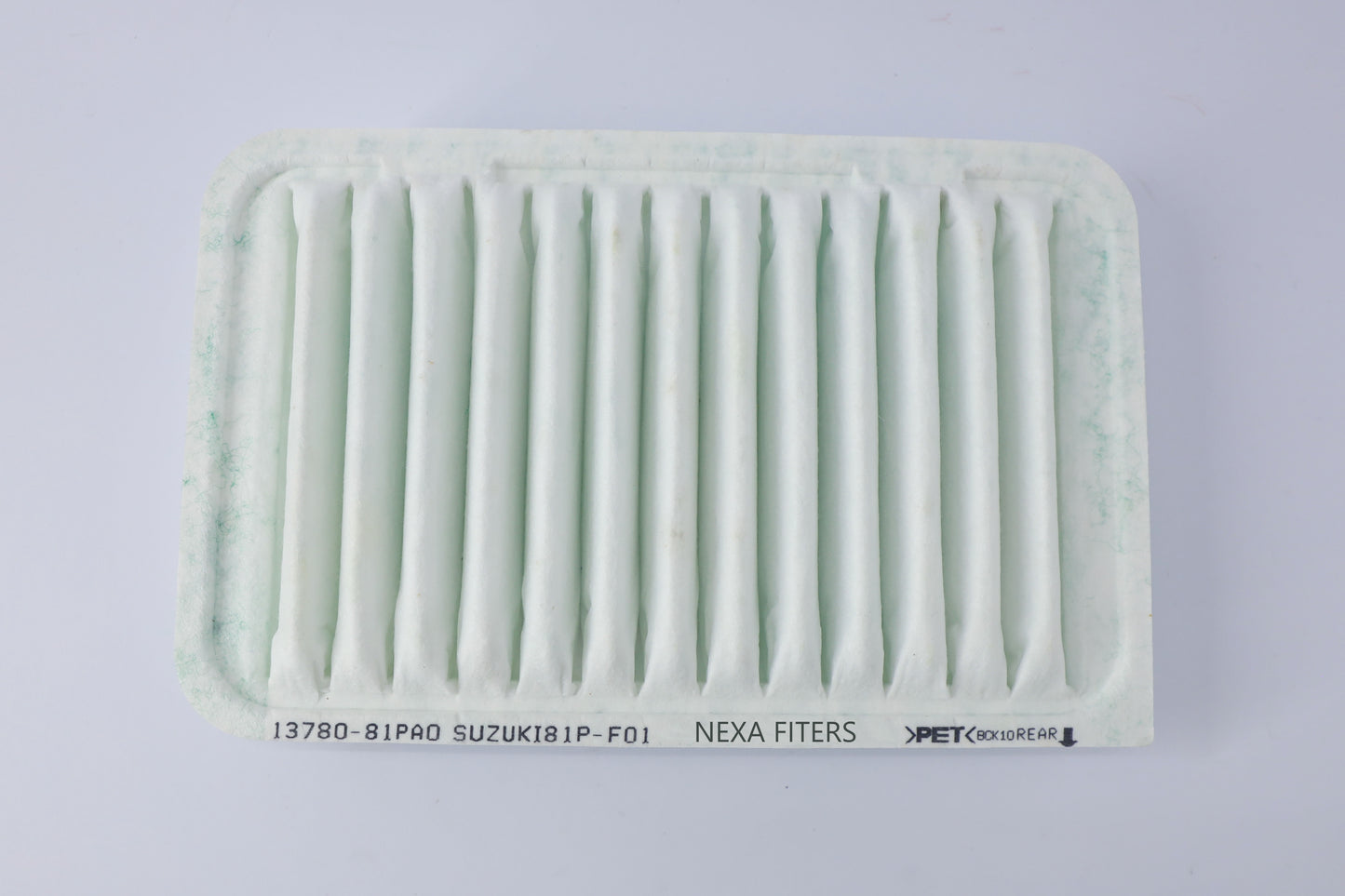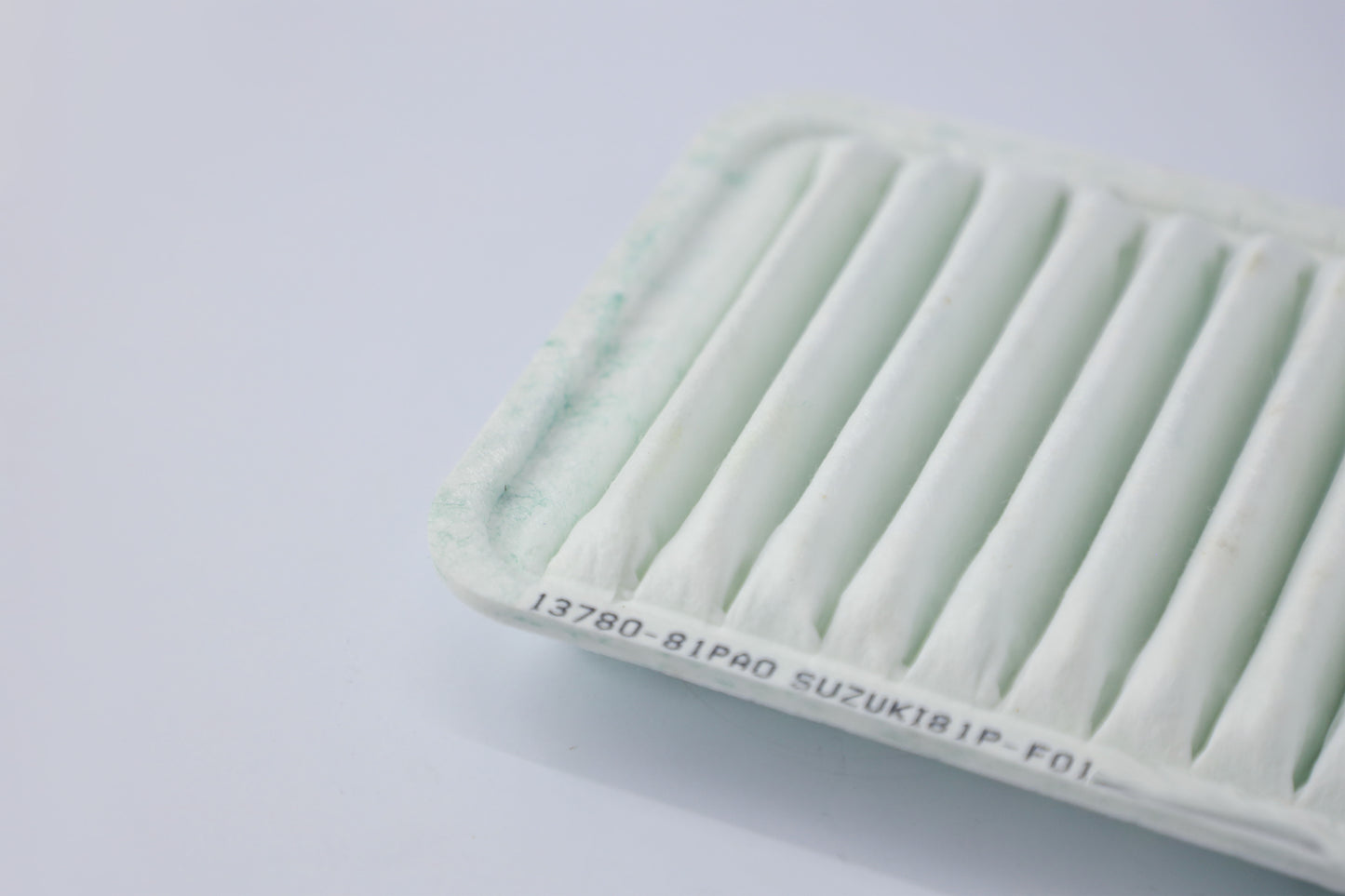My Store
AIR FILTER SWIFT (2022-ONWARDS)
AIR FILTER SWIFT (2022-ONWARDS)
Couldn't load pickup availability
13780-81PA0
The air filter in a Suzuki Swift is a crucial component of the vehicle's engine system. Its main function is to prevent dirt, dust, and other harmful particles from entering the engine, ensuring that only clean air is mixed with the fuel for combustion. A clean air filter allows the engine to operate efficiently, improving performance, fuel economy, and engine longevity.
Here’s a detailed description of the air filter in the Suzuki Swift:
Purpose of the Air Filter in the Suzuki Swift:
-
Protects the Engine:
- The primary role of the air filter is to stop contaminants such as dirt, dust, debris, and other particles from entering the engine’s intake system. These particles can cause significant wear and tear on engine components, reducing the engine's performance and efficiency.
-
Improves Combustion Efficiency:
- The engine requires a specific ratio of air and fuel to run efficiently. A clean air filter ensures that the correct amount of clean air flows into the engine, which optimizes the combustion process and helps achieve better fuel efficiency and power output.
-
Enhances Engine Performance:
- When the air filter is clean, the engine receives a consistent flow of clean air, which helps maintain smooth acceleration, better throttle response, and a consistent power output. A clogged filter can cause the engine to struggle, leading to a loss of power and poor acceleration.
-
Prevents Damage to Engine Components:
- Over time, dirt and particles can damage sensitive engine components like pistons, cylinders, and the fuel system. By filtering out contaminants, the air filter prevents premature wear of these vital components, extending the overall life of the engine.
Types of Air Filters in Suzuki Swift:
-
Paper Air Filter:
- The most common type of air filter used in the Suzuki Swift is the paper element air filter. These filters are typically made of several layers of paper that capture dirt and debris. They are cost-effective and provide good filtration, but they need to be replaced regularly to maintain engine performance.
-
Cotton Gauze Air Filter:
- Some aftermarket air filters may be made of cotton gauze, which is oiled to help trap dirt. These filters can be washed and reused, making them a more eco-friendly and long-lasting option. However, they may be more expensive than standard paper filters.
-
Activated Carbon Air Filter:
- Though less common in the Suzuki Swift’s engine system, some models might use an activated carbon filter for additional filtration. These are often used in cabin filters, but they can be used in air intake systems for specialized purposes like absorbing fumes or smells. They are typically more expensive and require more frequent maintenance.
Location of the Air Filter:
- In the Suzuki Swift, the air filter is located inside the engine bay, typically within a rectangular air filter housing. This housing is often situated near the front or top of the engine and is easily accessible for maintenance. The filter is secured with clips or screws, allowing for simple removal and replacement.
Signs the Air Filter Needs Replacing:
-
Decreased Engine Performance:
- If you notice a reduction in engine performance, such as sluggish acceleration, rough idling, or hesitation when you press the throttle, it could be due to a clogged air filter restricting airflow to the engine.
-
Decreased Fuel Efficiency:
- A clogged air filter can cause the engine to burn more fuel to compensate for the reduced airflow, leading to a noticeable drop in fuel efficiency.
-
Unusual Engine Sounds:
- A dirty air filter may cause the engine to make unusual sounds due to reduced airflow and increased strain on the engine.
-
Check Engine Light:
- In some cases, a clogged air filter may trigger the “check engine” light. The engine’s control unit may detect the lack of airflow, causing it to adjust fuel-to-air ratios, which can sometimes set off the warning light.
-
Visible Dirt or Damage:
- If you can see dirt or damage on the filter during a routine inspection, it’s time to replace it. The filter should generally look clean, with no visible tears, holes, or excessive dirt accumulation.
Recommended Replacement Interval:
- Every 5,000 to 10,000 kilometers (or approximately once a year) is typically recommended for replacing the air filter in a Suzuki Swift, though this can vary based on driving conditions. If you drive in dusty or polluted areas, you may need to replace the filter more frequently.
How to Replace the Air Filter in the Suzuki Swift:
-
Locate the Air Filter Housing:
- Open the hood of your Suzuki Swift and locate the air filter housing. This is typically a rectangular box made of plastic and may be secured with clips or screws.
-
Remove the Housing Lid:
- Open or unscrew the air filter housing to access the air filter. You may need to remove a few clips or screws to do this.
-
Take Out the Old Air Filter:
- Once the housing lid is off, carefully remove the old air filter. Take note of its orientation so you can install the new one in the same way.
-
Clean the Air Filter Housing (Optional):
- Before inserting the new filter, you can clean the inside of the air filter housing to remove any dirt or debris that may have accumulated.
-
Install the New Air Filter:
- Place the new air filter in the housing, ensuring it fits snugly and is oriented in the correct direction.
-
Reassemble the Housing:
- Once the new filter is in place, reattach the housing lid and secure it with the clips or screws.
-
Test the Vehicle:
- Start the engine and check that the vehicle runs smoothly. If there’s no unusual sound or performance issue, the replacement was successful.
Benefits of Regular Air Filter Replacement:
-
Improved Engine Performance: Regularly replacing the air filter ensures the engine receives a constant supply of clean air, optimizing fuel combustion and overall engine performance.
-
Better Fuel Efficiency: A clean air filter allows the engine to operate more efficiently, leading to better fuel economy and saving you money on fuel in the long run.
-
Reduced Engine Wear: Keeping the air filter clean helps protect internal engine components from dust and debris, reducing wear and tear and extending the life of your engine.
-
Lower Emissions: A clean air filter ensures the engine runs efficiently, which in turn can help reduce harmful emissions and improve the vehicle's environmental impact.
Conclusion:
The air filter in the Suzuki Swift plays a vital role in maintaining engine efficiency, performance, and longevity. Regular replacement of the air filter (every 5,000 to 10,000 km or as needed) is essential for keeping the engine running smoothly, improving fuel efficiency, and protecting it from harmful contaminants. Whether you opt for a paper filter or a cotton gauze filter, ensuring the air filter is clean and functional will keep your Swift's engine in peak condition for years to come.
Share




